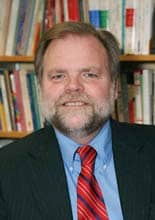I believe that our actions can, to some degree, either open or close the door to the blessings God intends for us. God is always moving through our lives, seeking wholeness and beauty and inviting us to be partners in Shalom and justice. God never abandons us -- and, in fact, may be more active seeking our salvation when we go astray. Our wholeness and the wholeness of creation are interconnected in such a way that God will not leave us, lose us, or cease to seek our salvation.
Yet, our actions limit the possibilities God can present to us at any given time. Grace abounds and God never gives up on creatures or creation; but in the call and response of life, God must adapt to our behaviors. The philosopher Alfred North Whitehead once noted that God's vision for each moment of experience is the "best for that impasse" and that sometimes the best may not seem very good, depending on our environmental context and our previous choices. Still, even when we stray from God's vision for us and our communities, God does not abandon us, but presents us with possibilities appropriate to our decisions and context. Turning back to God opens us to a greater influx of divine possibility and energy.
The passage from Hebrews continues the roll call of the faithful, highlighted in last week's lectionary. This passage contains both theological nuggets and problems for the preacher and will require a bit of explanation, if it is read in its entirety. Preachers have the option of reading just Hebrews 12:1-2, if they wish to simplify the passage and avoid the violent language of Hebrews 11. The passage begins with words reminiscent of the hymn, "Faith of our Fathers" or "Faith of our Parents, living still." We are part of a community of faith, beginning at the dawn of human history, and moving through the Hebraic peoples. With God alone as their hope, our parents fought the good fight, faced danger, and received God's blessing. Some, however, were martyrs, who faced death, physical punishment, and imprisonment. There is no "cheap grace" (Bonhoeffer) in this passage: faithfulness may require suffering and death, but God will reward those who run the race in faith. Even when death is unavoidable due to persecution or physical illness, God is faithful in presenting healing possibilities. God is in the business of salvation and healing, not abandonment!
We are part of the great spiritual adventure that inspired our parents in the faith. A cloud of witnesses surrounds and supports us, and challenges us by their faithfulness to look to Jesus as we run our race. Looking to Jesus, focusing on his example and witness, keeps us on the path, opens us to new divine possibilities, and awakens us to divine power in the midst of conflict. Our blessedness is not accidental, but comes from our participation in God's grace revealed in Jesus. By looking to Jesus, we open the door for God to make us Christ-like in all the seasons of life. We can be blessed even when circumstances appear to conspire against our well-being, for God never gives up!
The gospel reading asserts that faithfulness can be the source of conflict as well as comfort. God challenges every status quo. As Whitehead notes, the inflexible conservative, holding on to what is past and denying future possibilities, is going against the movements of the universe. The gospel passage does not deny the gifts of tradition, but places them in the wider perspective of God's movements toward Shalom, wholeness, healing, and justice.
"The present time" calls us to be vigilant. Faithfulness to God challenges us to seek new possibilities to respond to the novelties of our time, personally and communally. The preacher may choose to ask the congregation to explore the "signs of the times" as evidenced in the daily news as well as the spiritual lives of people today. With the late Marvin Gaye, the preacher is challenged to ask, "What's goin' on?" in our lives and world? Toward what behaviors do today's "signs" -- global climate change, economic instability, widespread unemployment, immigration -- call us. In the religious landscape, toward what approaches do the growing number of unchurched people and spiritual seekers call us?
How we respond to the signs of the times will lead to growth or stagnation. The times in which we live ask us to challenge our own particular status quos in light of God's vision of the future. We maintain our vineyard as Christ's disciples by our attentiveness and faithfulness to God's invitations emerging through the particular challenges of our lives. Looking toward Jesus' way of life and way of prophetic humility, we find wholeness and energy to be God's partners in personal and global healing and transformation.





